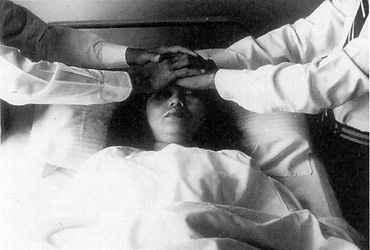
Blessing the Sick |

A young woman receives a Melchizedek Priesthood blessing of comfort and, if it is God's will, healing. The elders anoint the sick with consecrated olive oil (see James 5:14). Photograph, 1986; courtesy Floyd Holdman.
by Nephi K. Kezerian
Latter-day Saints are committed to the reality of healing through faith in Jesus Christ, to a health code (the Word of Wisdom) that is a form of preventive medicine, and to the proper use of modern medical skills.
Latter-day Saints believe that Christ ordained and sent his disciples, in ancient and modern times, with the promise that through faith they might heal. The gift of healing is one of the gifts of the Spirit, a gift that may be present both in the one who administers and the one who receives. The admonition of James is reenacted in LDS practice. "Is any sick among you? let him call for the elders of the church; and let them pray over him, anointing him with oil in the name of the Lord: And the prayer of faith shall save the sick, and the Lord shall raise him up; and if he have committed sins, they shall be forgiven him" (James 5:14-15; cf. D&C 42:43-44).
It is clear from modern revelation that even though not all have this gift of faith, they may still have faith in Christ and the gospel. In many LDS homes there is exercise of the gift of healing through administrations of the father's priesthood. Blessings of the sick are generally given by two Melchizedek Priesthood bearers. There are no prescribed prayers for this kind of blessing, but one of the priesthood bearers anoints the head of the sick person with a little consecrated olive oil and says in substance: "In the name of Jesus Christ and by authority of the Holy Melchizedek Priesthood, I lay my hands upon your head and anoint you with this consecrated oil, which has been dedicated for the blessing of the sick." Additional words may be said in harmony with, and under the guidance of, the Spirit.
Following this anointing, two or more priesthood bearers lay their hands upon the head of the sick person, and one being spokesman calls the person by name and says in substance, "In the name of Jesus Christ and by the authority of the holy Melchizedek Priesthood, we seal and confirm upon you this anointing with which you have been anointed to the end that…" He then voices a prayer of supplication and of blessing as the Spirit directs. The ordinance concludes in the name of Jesus Christ. If two priesthood bearers are not available for the ceremony, one may perform both parts of the blessing.
In the temples of the Church throughout the world, frequent prayers are offered for those who are sick, bereaved, or in need. The names of those afflicted may be placed upon a temple prayer roll by request of family or friends. This practice derives from abundant scriptural counsels regarding unity in prayer—"Be agreed as touching all things ye shall ask" (D&C 27:18)—and the conviction that the modern temple, as anciently, is a house of prayer (D&C 109:8). United prayer and fasting, sometimes by an entire ward or stake and in some historic instances by the full world membership of the Church, is occasionally advocated. This is the fulfillment of a divine admonition: "If ye are not one ye are not mine" (D&C 38:27).
Historically, miraculous healings have followed spiritual administrations to the sick for every kind of affliction, in every generation, and in every part of the Church. The promise is that the blind may receive sight, the deaf hear, the paralytic regain the use of limbs. Illustrative scriptural references are: "He that hath faith in me to be healed, and is not appointed unto death, shall be healed" (D&C 42:48). And those who "have not faith to be healed, but believe, shall be nourished with all tenderness" (verse 43).
Three scriptural cautions apply to the principle of blessing the sick. First, worthiness is to be cultivated by all. At any time, men or women may face the crisis of disease or injury and be asked to exercise faith in behalf of themselves or loved ones. Second, blessings are not to be given as signs for the skeptical, to satisfy curiosity, or to "consume it upon their lusts" (D&C 46:9). Faith in Christ is the prerequisite, not the consequence, of blessing the sick. Third, the resulting relief, healing, and fulfillment are not to be boasted about or heralded, but rather to "be spoken with care, and by constraint of the Spirit" (D&C 63:64; 84:73; 105:24). This is consistent with the plea of the Master in the New Testament after many of his miraculous healings: "See thou tell no man!" (Matt. 8:4; cf. D&C 50:33).
(See Basic Beliefs home page; Church Organization and Priesthood Authority home page; Priesthood Organization home page; Priesthood Ordinances home page)
Encyclopedia of Mormonism, Vol. 3, Blessing the Sick
Copyright © 1992 by Macmillan Publishing Company
All About Mormons |